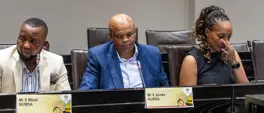JUDITH FEBRUARY & CHRIS OXTOBY | Language and the courts: Balancing principle and pragmatism
Judith February & Chris Oxtoby
21 July 2025 | 8:45The policy of using English as the sole language of record in the courts dates back to the tenure of former Chief Justice Mogoeng Mogoeng, writes Judith February and Chris Oxtoby.

Judge Mandisa Maya during her interview with the Judicial Service Commission on 2 February 2022 for the position of Chief Justice. Picture: @OCJ_RSA/X
While the country has been understandably focused on explosive allegations of criminal influence at top levels of the police and government, a speech by the Chief Justice has not featured much in the news cycle.
However, it raises important issues which deserve fuller attention and debate.
At the beginning of July, Chief Justice Mandisa Maya delivered a speech in which she reportedly raised concerns about the use of English as the sole language of record in the courts, arguing that this favoured judges' understanding of legal processes over the needs of litigants, thereby undermining access to justice.
The Chief Justice was quoted as suggesting that there are now many judicial officers who would be able to deal with court proceedings in languages other than English and Afrikaans, and identifying the role of language as central to questions of justice, dignity, and democracy.
Language is clearly an issue close to the Chief Justice’s heart. In 2020, she made history by penning the first ever superior court judgment in isiXhosa.
The policy of using English as the sole language of record in the courts dates back to the tenure of former Chief Justice Mogoeng Mogoeng.
In 2017, the heads of court adopted English as the sole language of record for the courts, based on considerations of financial constraints, practicality, the challenge of developing legal terminology in all official languages, resource limitations, and ensuring consistency and efficiency among judges.
Mogoeng further justified the policy by noting that not all appeal judges understood all official languages, and expressing concern about the impact on poor litigants of having to pay to have the court records of their cases translated.
These remain relevant factors and the concerns Chief Justice Maya raises should not be taken lightly. It would be all too easy for English speakers to overlook the impact of the use of a language as language of record in the courts.
Yet it is necessary to sound a note of caution about how such changes would be practically implemented.
South Africa has a poor record of launching attractive policy reforms without fully planning for how they are to be implemented. Should these initiatives then fail, the cause they seek to be advanced instead ends up being set back.
The impact of resource constraints on South Africa’s judiciary is a very real and very serious problem.
Judges battle constantly against infrastructural deficiencies, a lack of resources, a shortage of judicial officers, all of these problems underpinned by a lack of funding.
Any measures to further expand the functions and responsibilities of the judicial system, as laudable as they may be, have to be undertaken with understanding of this context.
In her speech, the Chief Justice identified several potential solutions for addressing the marginalisation of indigenous languages in the courts, included resource allocation, training judicial officers in indigenous languages, developing databases of legal terminology, and ensuring that universities teach customary law in African languages rather than in English.
Implementing these changes alone would be a major task. Considering the existing demands on – and the seeming inadequacy of - the judiciary’s budget, it is far from clear that the necessary funding for these solutions would be available any time soon, and training and database development would likely take some time to deliver results.
The Chief Justice is quoted as citing an example where a case had been conducted in isiXhosa, in which all parties were fluent, but a reviewing judge had taken the view that, for practical purposes, all proceedings should be conducted in English.
Chief Justice Maya describes this as “signal[ing] that systemic convenience continues to outweigh constitutional imperatives”, and the scenario certainly seems to be an absurd one.
But not all such issues will be as clear-cut. It is not difficult to imagine a situation where a judicial officer speaks four or five of the official languages fluently, but is confronted by a court record in an official language which she does not know, or is not sufficiently confident to handle proceedings in.
Nuances of language are often central to the outcome of cases. There are already inherent risks in the system that poor interpretation or the misinterpretation of words in a statute may lead to an injustice. We should be careful to avoid the risk of more of these situations occurring.
How a change to the existing language policy would be implemented in this context would need to be very carefully thought through, even as the idea has popular appeal.
South Africa is of course, not unique as a multi-lingual country grappling with a history of colonialism and exclusion.
In India, all court proceedings are conducted in English, although provision is made for the use of other languages in proceedings under certain circumstances, all judgments and orders must be in English. Similarly, English is the language of record in Malawi and Zimbabwe, with provision for the use of interpreters where necessary.
Further afield, Canada allows the use of English or French, though the presence of only two official languages, rather than 11, doubtless simplifies matters, as would the presumably great budgetary resources available to the judiciary in a developed country.
What these examples suggest is that South Africa is not alone in attempting to cut the Gordian knot of how to deal with multiple official languages by simply designating one as the official language of record. But, as with any idea, it needs a strategy and resources, financial and intellectual, to come to fruition.
Get the whole picture 💡
Take a look at the topic timeline for all related articles.

















